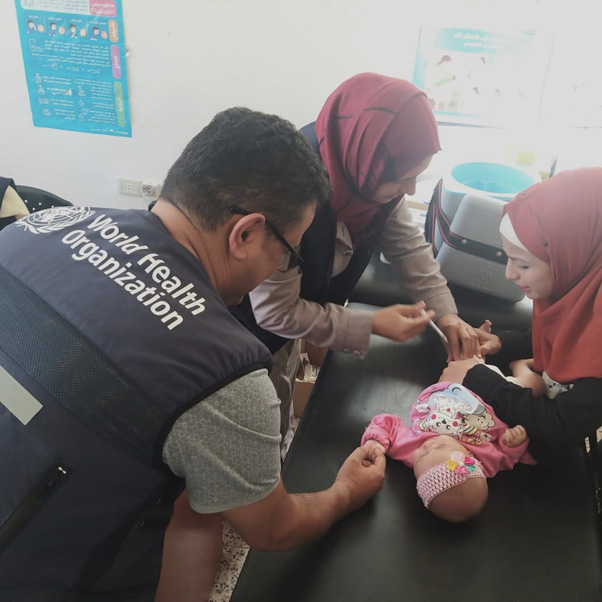 Immunization activity in rural Damascus, Syria, 2024. Photo credit: WHO Syria23 April 2024, Damascus, Syria – Syria’s first round of its Big Catch-Up vaccination activity began this week. The 10-day initiative was launched by the Syrian Ministry of Health in partnership with WHO and the United Nations Children’s Fund (UNICEF). Two further rounds of vaccination activity under the campaign are scheduled for July and October 2024.
Immunization activity in rural Damascus, Syria, 2024. Photo credit: WHO Syria23 April 2024, Damascus, Syria – Syria’s first round of its Big Catch-Up vaccination activity began this week. The 10-day initiative was launched by the Syrian Ministry of Health in partnership with WHO and the United Nations Children’s Fund (UNICEF). Two further rounds of vaccination activity under the campaign are scheduled for July and October 2024.
WHO is providing technical support to the Ministry of Health and covering the operational costs of the Big Catch-Up campaign. This has been made possible by generous contributions from Gavi, the Vaccine Alliance, and the United States Agency for International Development’s Bureau for Humanitarian Assistance.
The first round of activity will involve screening more than 2 million children aged under 5 years across Syria. These children were missed during previous campaigns owing to factors including access and population movements. All the screened children will receive the bivalent oral polio vaccine (bOPV), regardless of their vaccination history.
To achieve this, 7393 health workers from the Ministry of Health – including 4541 vaccinators at fixed sites and 1097 mobile medical teams – will be deployed to 993 health facilities and 70 temporary vaccination posts. To monitor the vaccination activity, 365 supervisors at different levels will check on progress during its implementation.
Further, 1769 communications officers will join the effort, to ensure proactive risk communication and community engagement – crucial to promote vaccination of children. To further encourage vaccine uptake, 1755 mosques and 209 churches will share key messages with communities.
Dr Iman Shankiti, acting WHO Representative to Syria, emphasized the importance of vaccination as a crucial public health strategy. “Vaccination saves millions of lives globally and is among the most cost-effective health interventions available,” she said. “WHO remains dedicated to its mission of ensuring that all children in Syria are protected from vaccine-preventable life-threatening diseases.”
The first round of the Big Catch-Up initiative overlaps with World Immunization Week, which takes place every April. This annual campaign aims to promote the use of vaccines to protect people of all ages against disease. This year’s theme is “Humanly Possible: Saving lives through immunization”.
In 2024, WHO and partners also mark 50 years of the Expanded Programme on Immunization (EPI). This anniversary highlights the great progress being made to catch up on essential immunization and get back on track to ensure that more people are protected from preventable diseases.








